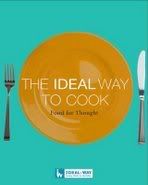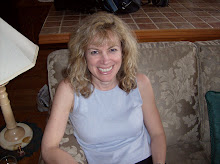
Pt. II of last week's post. This post written by Janette Hajjar, mother of Robert Pio Hajjar. Excerpt from "The IDEAL WAY to Cook: Food for Thought."
Robert Pio has been our blessing. We have been rewarded with his love, compassion, sensitivity, humour, and wit. His greatest pleasure is to surround himself with the family members who have nurtured and guided him through the years. Rob will gladly give away all he has, yet ask for nothing in return. He judges no one, yet does not realize there are people in this world who would take advantage of his gentle and honest nature. He has never deviated from his daily ritual of kissing us good night and good morning. His dedication to the Lord and Padre Pio is unwavering, and he makes time each and every day to hear mass alone in his room.
Rob has given us such joy and happiness that we could not fathom living without him! Don't get me wrong, he's not perfect by any means. There have been times when he has angered and frustrated me to the point that I have wanted to plunk him on the sidewalk with a "Free for the Taking" sign around his neck! I can't count the number of times I have sobbed because I felt I couldn't do it anymore, that I was tired and burned out. Even at my breaking point with him, and my harsh words, Rob's immediate forgiveness humbles me to the core. Like the innocent child he is, he will open his arms to give me one of his special warm hugs, and all is forgotten. I am reminded, again and again, that I am dealing with one of God's special children. How much gentler and better our world would be if we were more like them.
Growing up, my only exposure to someone with Down syndrome was Roger. This gentle giant lived down the street from us with his elderly parents. I never knew what he did or where he went during the day, and I felt sorry that he didn't have friends his age. What I do remember is how much the children enjoyed following him wherever he went.
If you ask me if I would have terminated the pregnancy back then if I knew my baby had Down syndrome, in all honesty my answer would have been, "I don't know." However, if I knew then what I know now, my answer would be a resounding "NO!"
Parents of children with special needs belong to a "special fraternity" and membership comes at a steep price. Our plane was diverted to Holland; we never made it to Italy. We have travelled a long, lonely road that is not for everyone; one paved with tears, sacrifice, dedication and, above all, patience. "We get it" when others don't. Our universal concern is, "what will happen to my child when I am gone?"
We could not imagine life without our Robert Pio. Our reward at the end of the rainbow is the satisfaction of knowing we have raised our special child to be a proud and contributing member of society, the I.D.E.A.L. child:
In closing, I would like to leave you with a very special poem that came to me shortly after Robert's birth. I hope that it will touch you as much as it did me so many years ago. [See this post - "The IDEAL WAY to Cook" - for poem.] God bless.
Photo: Robert Pio Hajjar with his parents, El and Janette Hajjar.
















































